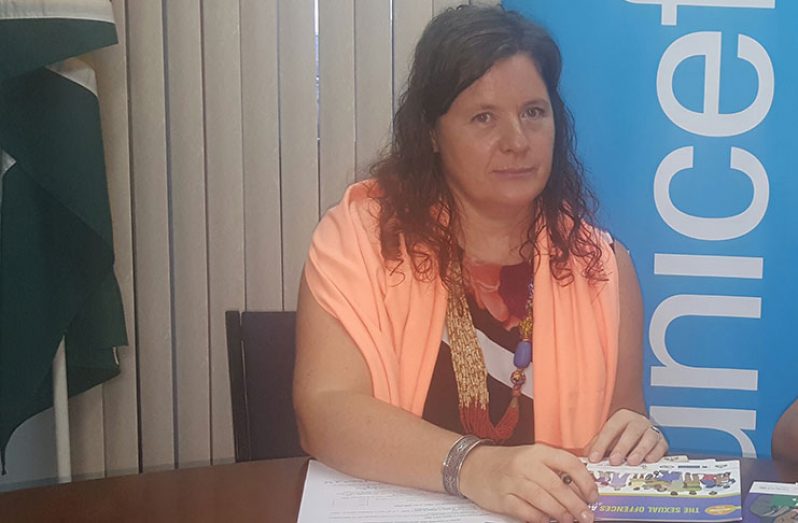–UNICEF says, as it raps stigma attached to hinterland children
By Alexis Rodney
THE United Nations Children Fund (UNICEF) says it will not support the notion that children in the hinterland regions are less privileged than those on the coastland.
It also favours the idea that should they be given equal opportunities, they all would be at the same level.
The international child rights organisation said that should these “equity gaps” be bridged, much of the social and economic strains experienced by children in hinterland communities would be lifted.
UNICEF Country representative, Sylvie Fouet told the Guyana Chronicle recently that there are too many negative notions attached to the hinterland regions, and the social and economic footing of the people are among the discriminatory concepts being embraced.
While there remains a fountain of other issues, access to quality education is also seen as a major problem.
“They are not poor; they just don’t have the same equal access to education as children on the coast,” Fouet said, adding:
“So, if it takes me three miles to go to school in the interior, whereas for a child in Georgetown it is around the corner, then we have to make the school available closer to the child. So it is really looking at actions that will reduce that inequity so that you have equal opportunities and no one is left behind.”
INEQUITY HURTS
She said inequity hurts equal development, and was adamant that every child, “whether he lives in Linden, Georgetown or Aishalton,” should have the same rights with access to school.
She said, however, that geography says something else. According to her, Guyana’s unique geography makes it somewhat difficult.
UNICEF, she explained, has been seeking to address the issue, however challenging it may seem. She said the organisation has been working with schools through the youth-friendly service.
“It is basically trying to reduce the vulnerability of those who are most at risk, and trying to ensure that they are supported, as well as ensuring that no child is left behind,” she explained about its achievements thus far.
She pointed to a recent study done by UNICEF, which shows that while in Georgetown there may be 100 children entering primary school, chances are that 75 or more of that amount will enter into secondary school. However, in the hinterland, where about 100 children would enter the primary school, only 53 get to make it into the secondary system.
“That shows that a lot of teenagers are not given an opportunity to have a secondary education,” she said.
Fouet said that here in Guyana, there is a high number of pregnancies and violence among teenagers. She said these are mostly due to the lack of quality education, and the impact of the informal economy. She underscored that UNICEF is in support of the government and other non-State entities to address the problem.
UNICEF is also pushing the innovation of sport and development in education. According to Fouet, there are not much extracurricular activities in schools; an opportunity where students could learn leadership and life skills from being involved.
CHILD MARRIAGE
Meanwhile, Fouet also sought to put the rest the notion that underage sexual activity and child marriages are practices that only pervade the interior regions. Details from the Child Care and Protection Agency shows that they are done across the ethnic spectrum, especially where customs are deeply embraced.
To make it a larger debate, Fouet said ending child marriage has to be critical, not only in the law, but in the behaviour-change approach, which includes beliefs and customs. She said that is what the youth friendly service is also hoping to achieve.
“A lot of teenagers do not know about protection. It is not completely denying that sexual intercourse is happening; it is getting young people access to healthy lifestyle choices. It is a lot about behaviour changes,” she told the Guyana Chronicle. She said that while a child should not be married before the age of 18, it is a known fact that there are certain behaviours and traditions that spread across every ethnic group in Guyana.
“And I know there are a lot of reasons why you would let your girl or boy be married,” she said. “And these include poverty, lack of education, lack of opportunities etc. It is not to be judging, but those teens are the leaders of tomorrow.”












